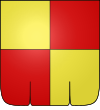Charles de Gontaut | |
|---|---|
| 1st Duke of Biron | |
 Sketch of the duke from the circle of Daniel Dumonstier. | |
| Coat of arms |  |
| Other titles | Marshal of France Admiral of France Governor of Bourgogne |
| Born | c. 1562 Kingdom of France |
| Died | 31 July 1602 Bastille, Kingdom of France |
| Family | Famille de Gontaut |
| Father | Armand de Gontaut, baron of Biron |
| Mother | Jeanne, dame d'Ornezan |
Charles de Gontaut, 1st Duke of Biron (c. 1562–31 July 1602)[1] was a French noble, military commander, Admiral, Marshal and governor during the final days of the French Wars of Religion. The son of Marshal Armand de Gontaut, baron de Biron who had served the crown militarily throughout the religious wars, Biron made his entry into French politics in the late 1580s. Initially a follower of the chief royal favourite Épernon by 1589 he was a candidate to become Admiral of France. In August 1589 Henri III was assassinated, and Biron and his father transferred their loyalties to the Protestant Henri IV putting them at war with the Catholic ligue. He fought at the royalist victories of Arques and Ivry in late 1589 and early 1590, during which he developed a reputation as an exceptional commander. In 1592 he became Admiral of France, a post he would hold for two years, before being compelled to trade it for the title of Marshal so that it could be offered to a rebel. In 1593 Biron invaded Bourgogne, and succeeded in capturing many villages, but was unable to secure any major cities. In 1595 he would again invade Bourgogne with considerably more success, Beaune, Auxonne, Autun and finally Dijon falling to him in late May of that year. During the campaign, Henri would grant him the governate of Bourgogne. A Spanish army under the Constable of Castilla invaded in response and joined forces with the duke of Mayenne lieutenant-general of the ligue. Having called on Henri for support, Biron and his king would best the Constable and duke against the odds at Fontaine-Française.
This largely marked the end of the domestic civil war, as the conflict transformed into an international one against España. In 1597 Biron led the successful siege of Amiens, the city having recently been taken by surprise by the Spanish. He signed the Treaty of Vervins with the Spanish the following year. He was then tasked with making war on the duke of Savoie which he would conduct for the next few years, seeing continued success. Around this time, he began to be courted by the Savoyard duke, who saw in his tense relations with Henri the potential for a useful defection. According to the testimony of La Fin he entered a formal treaty to betray Henri in 1600, by whose terms he would be established as a largely independent ruler of Bourgogne under the overall authority of the Spanish, in return for his betrayal of Henri. No such treaty has however ever been found. In January 1601 France made peace with Savoie in the Treaty of Lyon, by the terms of which France traded their former possession of Saluzzo for a collection of other territories. Biron was established as governor of these, but a fortress he had to fight particularly bitterly for was granted to a Protestant governor, embittering him. Shortly thereafter, Biron confessed to Henri that in the heat of the moment after this he had entertained treasonous thoughts, he was forgiven for this by Henri who dispatched him on a diplomatic mission. In March 1602 La Fin came to Henri, claiming to have evidence that Biron's treason ran far deeper, alleging a treaty had been formed, and that Biron was to have put Henri in line of enemy fire during the prior campaign. Henri, believed these accusations, and arranged for Biron to come to court in June. Biron was reluctant but was eventually coaxed into appearing. Repeatedly urged to confess to treason, Biron maintained his innocence. He would be convicted by the Paris Parlement on 27 July, and despite the protests of much of the upper nobility he would be executed at the Bastille on 31 July 1602.
- ^ Jouanna 1998, p. 1494.
